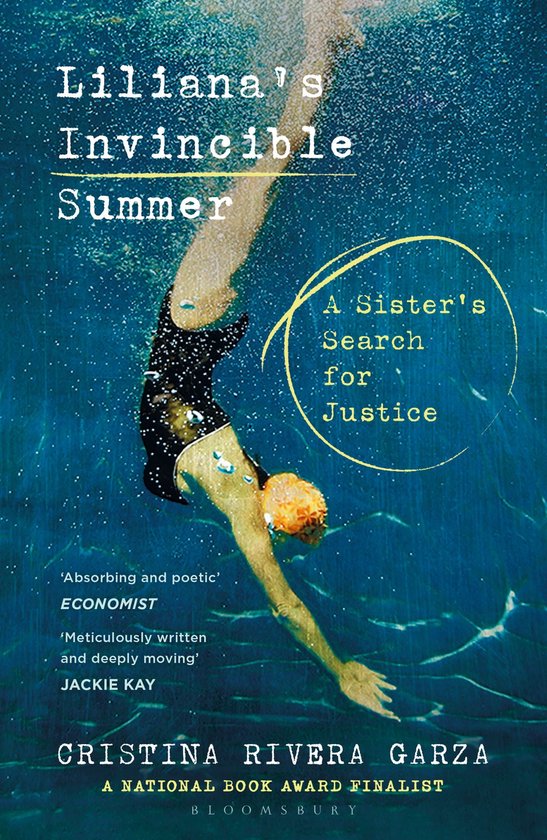
Liliana's Invincible Summer
An astonishing work of creative non-fiction from one of Mexico's greatest contemporary writers, that reignites the brilliant spark of a young woman erased and illuminates an epidemic of femicide in Mexico
WINNER OF THE PULITZER PRIZE FOR MEMOIR A 2023 NATIONAL BOOK AWARD FINALIST A NEW YORK TIMES, WASHINGTON POST, TIME AND NEW YORKER BOOK OF THE YEAR ‘Meticulously written and deeply moving . . . A triumph’ JACKIE KAY ‘Absorbing and poetic’ ECONOMIST ‘Full of tenderness and beauty’ MARIANA ENRIQUEZ From one of Mexico’s greatest contemporary writers, an astonishing work of non-fiction that illuminates an epidemic of femicide in Mexico through the death of one woman. I seek justice, I finally said. I seek justice for my sister . . . Sometimes it takes twenty-nine years to say it out loud, to say it out loud on a phone call with a lawyer at the General Attorney’s office: I seek justice. On the dawn of 16 July 1990, Liliana Rivera Garza, Cristina Rivera Garza’s sister, was murdered by her ex-boyfriend and subsumed into Mexico's dark and relentless history of femicide. She was a twenty-year-old architecture student who had been trying for years to end her relationship with a high school boyfriend who insisted on not letting her go. A few weeks before the tragedy, Liliana made a definitive decision: at the height of her winter she had discovered that, as Albert Camus had said, there was an invincible summer in her. She would leave him behind. She would start a new life. She would do a master's degree and a doctorate; she would travel to London. But his decision was that she would not have a life without him. Returning to Mexico after decades of living in the United States, Cristina Rivera Garza collects and curates evidence – handwritten letters, police reports, school notebooks, voice recordings and architectural blueprints – to defy a pattern of increasingly normalised, gendered violence and understand the life lost. What she finds is Liliana: her sister’s voice crossing time and, like that of so many disappeared and outraged women in Mexico, demanding justice.
WINNER OF THE PULITZER PRIZE FOR MEMOIR A 2023 NATIONAL BOOK AWARD FINALIST A NEW YORK TIMES, WASHINGTON POST, TIME AND NEW YORKER BOOK OF THE YEAR ‘Meticulously written and deeply moving . . . A triumph’ JACKIE KAY ‘Absorbing and poetic’ ECONOMIST ‘Full of tenderness and beauty’ MARIANA ENRIQUEZ From one of Mexico’s greatest contemporary writers, an astonishing work of non-fiction that illuminates an epidemic of femicide in Mexico through the death of one woman. I seek justice, I finally said. I seek justice for my sister . . . Sometimes it takes twenty-nine years to say it out loud, to say it out loud on a phone call with a lawyer at the General Attorney’s office: I seek justice. On the dawn of 16 July 1990, Liliana Rivera Garza, Cristina Rivera Garza’s sister, was murdered by her ex-boyfriend and subsumed into Mexico's dark and relentless history of femicide. She was a twenty-year-old architecture student who had been trying for years to end her relationship with a high school boyfriend who insisted on not letting her go. A few weeks before the tragedy, Liliana made a definitive decision: at the height of her winter she had discovered that, as Albert Camus had said, there was an invincible summer in her. She would leave him behind. She would start a new life. She would do a master's degree and a doctorate; she would travel to London. But his decision was that she would not have a life without him. Returning to Mexico after decades of living in the United States, Cristina Rivera Garza collects and curates evidence – handwritten letters, police reports, school notebooks, voice recordings and architectural blueprints – to defy a pattern of increasingly normalised, gendered violence and understand the life lost. What she finds is Liliana: her sister’s voice crossing time and, like that of so many disappeared and outraged women in Mexico, demanding justice.
| Auteur | | Cristina Rivera Garza |
| Taal | | Engels |
| Type | | Paperback |
| Categorie | | Mens & Maatschappij |



